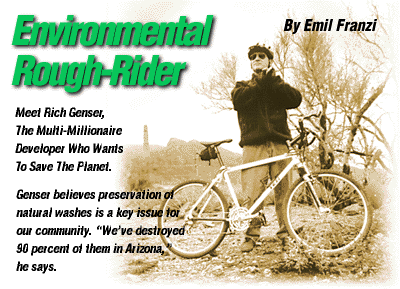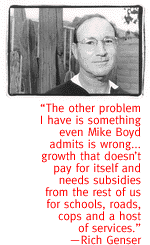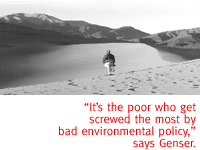
HE'S THE CHAIRMAN of the local Sierra Club.
He's also a multi-millionaire developer who owns and builds apartment
buildings. He's a hard-core preservationist who declines the term
"environmentalist." He's a Republican, and a not a very
liberal one; if it were his call, Saddam Hussein would have been
sent bye-bye long ago. He loves to hike, raft and ride his mountain
bike and horses. He's a member of the National Rifle Association
and the Tucson Rod & Gun Club. He's a populist who currently
lives in a gated community. He thinks his industry--in which he's
a major player, at one time owning more than 1,000 apartment units--gets
away with murder. And he's a strong believer in restrained growth.
He's Rich Genser, a unique individual in this town. And many
can't quite figure him out.
 It isn't because he's shy about telling you where he stands.
He's usually there at public hearings giving politicians an earful,
particularly on environmental issues. He writes letters to editors,
public officials and others. He's got strong opinions concerning
just about everything. And on a bad day he probably scares his
own side as bad as his opponents. Like Gen. George Patton, Genser
likes it that way.
It isn't because he's shy about telling you where he stands.
He's usually there at public hearings giving politicians an earful,
particularly on environmental issues. He writes letters to editors,
public officials and others. He's got strong opinions concerning
just about everything. And on a bad day he probably scares his
own side as bad as his opponents. Like Gen. George Patton, Genser
likes it that way.
Given some historical perspective, however, Genser's not that
hard to figure out. Again, like Patton, he's a throwback. Most
of Genser's views closely parallel those of another guy he doesn't
mind being compared to--Teddy Roosevelt.
Like Genser, Roosevelt loved the outdoors and fought to preserve
it; was from a big eastern city and fell in love with the natural
beauty of the west; was a wealthy man who was suspicious--and
at times downright contemptuous--of big business. And like Genser,
Roosevelt cared about working people. He was a patriotic nationalist
who believed in a strong military and American presence around
the globe. And he spent a lot of time at the shooting range. Roosevelt
has been called an uncompromising moralist. That description fits
Genser just fine.
Richard Edward Genser was born in South Orange, New Jersey, in
1944, grew up in Newark, and graduated from Colorado State University
in 1966. He served in the New Jersey Air National Guard and rose
to staff sergeant. A successful Chevrolet dealer in Irvington,
New Jersey, he moved to Tucson in 1987. He has one son from his
first marriage, 17-year-old Jason, who shares his father's love
of the outdoors. Genser is currently married to his second wife,
Claire, who also enjoys many of those activities.
He's no newcomer when it to preservation of our wild spaces.
He's been a Sierra Club member since the late '60s "when
we weren't considered radicals," and participated in saving
New Jersey's Great Swamp.
"My father and uncles used to hunt ducks there," Genser
says. "They told me how many ducks there had been. I thought
there were still a lot, but then I noticed the decline. That we
were able to restore and preserve this natural area has been good
not only for tourists but for the quality of life of the people
who live there."
Genser is big on that quality-of-life issue. "The outdoors
isn't something that should be enjoyed just by rich people,"
he says. "It's important for all of us."
He tells the story of a woman who called him in tears a few years
back. "She lived in a trailer below River Road. One of her
biggest enjoyments was sitting in a lawn chair behind her home
and enjoying the peace and quiet of the wash that was there and
seeing the birds and wildlife. She woke up one morning to the
bulldozers cementing it in. She didn't know who to call, so she
tried the Sierra Club. It was too late, and that was tragic--that
lady's quality of life had been destroyed."
Genser believes that preservation of natural washes is a key
issue for our community. "We've destroyed 90 percent of them
in Arizona," he says. "We're a desert--they contain
a disproportionate amount of our native wildlife and plants. Washes
are natural parks. They're a great place for human activity too--like
taking walks. And you can't get the bean-counters who build to
grasp that it isn't that hard or expensive to leave them alone.
I was part of one apartment project where it would have been simple
to leave a natural wash. I was told it would cut the profit margin
from 39.8 percent to 39.6 percent. So what? We were all rich already!"
ALTHOUGH THE SIERRA CLUB, created almost a century ago
to champion national and state preservation issues, is focused
on broader issues and bigger battles, Genser notes the 2,700-member
local Rincon Chapter has formally endorsed many positions on local
issues, including wash preservation. Its members are active in
many other groups that concern themselves with local policy.
"The problem locally is that what ordinances we have are
weak, and then local governments either give waivers or don't
enforce them," Genser says. "But the thought that we
need to get together again, as proposed by Supervisor Mike Boyd,
to discuss what to do about the problems of urban sprawl and the
impact of growth, is ridiculous--we already know what the problem
is and what to do. Eighteen environmental, conservation and neighborhood
groups spelled it out for them in three pages: Preserve washes,
tighten grading and hillside ordinances, and expand the buffers.
A majority of the supervisors support that consensus."
Genser bristles over terms like "tree-hugger" and "no-growther."
"Those epithets lend little to the honest debate over how
our admitted growth problems should be handled," he says.
"Land speculators and developers have no legal or moral right
to be guaranteed a profit. We've made many thoughtfully conceived
proposals that will benefit the total population, instead of enriching
the already rich. I've worked with the finest people who have
the highest integrity and are not selfishly motivated. The natural
beauty of this--and other areas--is why people move here. Destroying
it for short-term gain makes little sense, and hiding behind name-calling
proves nothing."
 Along with the Sierra Club, Genser supports the initiative setting
up Urban Growth Boundaries (UGB) in Arizona.
Along with the Sierra Club, Genser supports the initiative setting
up Urban Growth Boundaries (UGB) in Arizona.
"It's only a first step and the developers are organizing
to oppose it," Genser says. "Gov. Hull's so-called alternative
is an attempt to confuse voters and gut the UGB with a counter
proposal. The whole state is fed up with current growth policies.
The folks in rural areas are inundated with new development, and
it's killing their lifestyle and hitting them in the pocketbook.
Maricopa County voters are figuring it out, too--that's why Hull
is essentially fronting for the developers. She may turn out to
be Fife in a skirt. You'll know if she signs the bill prohibiting
local communities from down-zoning."
Genser would go further than the UGB: "If you really want
to slow down growth and sprawl and inject genuine equity into
the tax structure, repeal those provisions in the tax code that
allow speculators to rezone large tracts of agricultural land
and continue to dodge taxes by keeping a few cows on them and
claiming an agricultural exemption. If Rocking K or Rancho Vistoso
or Canoa are still real ranches, then anybody with a couple of
tomato plants in their house should get a farm subsidy."
Unlike many of his environmental colleagues, he isn't opposed
to ranching on public lands. "The real problem isn't cows
on the land, it's over-grazing. I can tell the difference between
real ranchers and farmers and land speculators. The tax code should
too. I'd rather see cattle on open space than more tract homes
and strip malls. Ranchers should quit being afraid of all environmentalists--we've
got more in common than many believe."
GENSER SEES A grander coalition for that open-space preservation
he so passionately supports. "My position is really simple:
Preserve it first, then we'll fight about who gets to use it."
And he isn't opposed to all land speculation. "I have great
respect for business people, including land speculators. Profit
is fine. I don't criticize people for being rich, but for greed
and un-needed destruction. And I really object when they pretend
to be environmentally 'sensitive' by boxing up a few trees that
will die anyway and then clear-cutting a couple hundred acres.
That's crap and everybody knows it.
"The other problem I have is something even Mike Boyd admits
is wrong--growth that doesn't pay for itself and needs subsidies
from the rest of us for schools, roads, cops and a host of services.
Real impact fees would be a lot more than the pittance local builders
fought so hard to stop."
Take most flood-control projects. "They're often just welfare
for the rich and sometimes for the stupid,"Genser says. "If
you're dumb enough to buy a house where you're looking up at the
bottom of a bridge, why should the rest of us pay to protect you?
Where washes were rechanneled and cemented, changing the flow,
that's a problem government caused and should take responsibility
for. But when builders have been allowed to alter sheet-flooding
below them, endangering the homes of others, that's a violation
of property rights that should be paid for by the offending party."
Genser opposed the recent county road bonds package. "You
move somewhere where there's a two-lane road, and now the new
arrivals like you have caused more traffic, so you need a four-lane
road--why is that our problem and why should the rest of us pay
to solve it?"
Even though he disagreed with the Board of Supervisors' majority
on the road bonds, Genser isn't critical of most supervisors as
individual politicians--with the exception of Boyd.
"He exhibited initial sincerity on conservation issues and
then totally reversed himself," Genser complains. "One
of the last acts of the old board occurred when Boyd joined (former
supervisors) Marsh and Moore in allowing Rocking K to expand into
the buffer (surrounding Saguaro National Park East). His attempt
to appoint some loaded blue-ribbon panel on sprawl is nothing
but a stall and a copy of what the Governor is trying on Urban
Growth Boundaries. And he shouldn't get any credit for
what the new board is trying to do in passing tougher growth and
sprawl ordinances. He didn't really do anything except bring up
the subject--his actions were limited and hesitant. It was Sharon
Bronson, supported by Raul Grijalva and Dan Eckstrom, who actually
did something to move the process forward."
When Boyd argued against opposing a land swap between ASARCO
and the U.S. Forest Service which would have handed over thousands
of acres of the scenic Santa Rita Mountains to the mining company,
Genser wrote Boyd a letter in which he said simply: "What
you do speaks so loudly that we can't hear what you're saying."
Genser gives high marks to both Bronson and Grijalva: "She's
bright, solid on the issues, and doesn't waffle. You might not
always agree with her, but she does her homework and works hard
representing her constituency. Grijalva is receptive and supportive
of most of what we believe in. I only wish the two of them would
get along better and plan things together."
He also has good things to say about Supervisor Ray Carroll:
"Basically solid, good business and professional background.
He's got a handle on many growth issues and has been a stand-up
guy."
And he has no real quarrel with Dan Eckstrom: "He does a
great job of representing his constituents, too, and generally
votes in a reasonable manner. I only wish he'd spend more time
talking with us about environmental issues that affect his district--like
air and water quality. Environmental concerns aren't just for
rich people. It's the poor who get screwed the most by bad environmental
policy."
He's got mixed feelings about his fellow Republican, U.S. Rep.
Jim Kolbe: "A fine gentleman who's been great in many areas,
but he makes no sense on many environmental issues. He's been
too close to mining and development interests. And now his response
to the local pygmy owl controversy is talk about 'reform' of the
Endangered Species Act (ESA).
"Nixon signed that law and it had the overwhelming support
of both parties in both houses of Congress. It had popular support
then and now. We're going to start bumping up against it every
day because we've pushed more species to the brink--the pygmy
owl is just one example. Kolbe wants it 'reformed' because it's
become inconvenient for developers. Reform it? Private groups
have to sue now to get it enforced."
But Genser sees the ESA as more than just a last-gasp measure
for American wildlife.
"Restoration is possible in many areas," he says. "And
we ought to remember that it's the ESA that saved the American
Bald Eagle."
GENSER IS MORE THAN just a theoretical conservationist.
He's hiked, climbed, boated, rafted or ridden horses through many
acres of America's wilderness, from the Florida Everglades to
Colorado sand dunes. He not only wants to preserve what's there,
he'd like to put some of it back like it was.
 And he's got a definite agenda for Arizona. "This is a beautiful
place," he says. "That's why people want to live here.
To destroy that beauty is a terrible thing. If those in charge
were really serious about preservation, here's what they'd really
do. First, build a high-speed train on existing right-of-way all
the way from Nogales to Salt Lake City, with flat cars for autos
so you'd be able to move around when you arrived. That'd take
tons of air pollution away, improve highway safety, and reduce
road-maintenance and construction costs. I have nothing against
cars or air-conditioning, or other things we all find convenient,
but there's rational ways to reduce usage.
And he's got a definite agenda for Arizona. "This is a beautiful
place," he says. "That's why people want to live here.
To destroy that beauty is a terrible thing. If those in charge
were really serious about preservation, here's what they'd really
do. First, build a high-speed train on existing right-of-way all
the way from Nogales to Salt Lake City, with flat cars for autos
so you'd be able to move around when you arrived. That'd take
tons of air pollution away, improve highway safety, and reduce
road-maintenance and construction costs. I have nothing against
cars or air-conditioning, or other things we all find convenient,
but there's rational ways to reduce usage.
"Next, pass tough statewide wash, hillside, and native plant
laws--and enforce them. No more saguaro and ironwood clearcuts.
And reform state land policy to quit defining 'highest use' as
'best.' And then repeal every law that stops cities and counties
from controlling and restraining growth however the local population
wants, and allow all jurisdictions to charge genuine impact fees."
Would Genser ever be a candidate for public office? It's clear
that should he ever jump into any local race, he'd be a 900-pound
gorilla.
"I've thought about it, but I like to speak my mind, and
that would offend a whole lot of people, particularly the Big
Boys. I don't think I could get elected, but I wouldn't back off."
And that, of course, sounds like another guy who offended the
power structure, never backed off, and always told you where he
stood. His name was Theodore Roosevelt.

|





